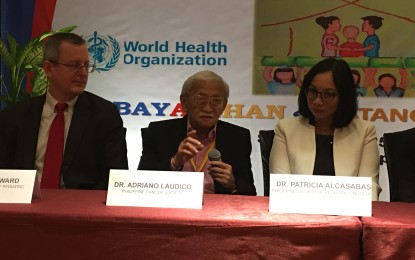
ANTI-CANCER DRIVE. Dr. Adriano Laudico (center), Philippine Cancer Society representative, says the government has been providing free chemotherapy agent for acute lymphocytic leukemia, in a press conference in Pasay City on Wednesday (Sept. 25, 2019). Laudico said acute lymphocitic leukemia is the most curable type of childhood cancer. (PNA photo by Ma. Teresa Montemayor)
MANILA -- The World Health Organization (WHO) has designated the Philippines as the first focus country in the Western Pacific for the Global Initiative for Childhood Cancer.
“One year ago, the United Nations established this initiative at the UN General Assembly. The country was selected because of its tremendous efforts happening on the ground where the pediatric society and the civil society have mobilized such momentum on behalf of the patients and their families,” said Dr. Catherine Lam, WHO Collaborating Center for Childhood Cancer co-director, at the National Childhood Cancer Stakeholder press conference in Pasay City on Wednesday.
Lam added that strong political commitment and foundation efforts supporting children with cancer as proven by the passage of twin health legislations -- the Universal Health Care (UHC) Act and the National Integrated Cancer Control (NICC) Act.
Dr. Patricia Alcasabas, president of the Philippine Society of Pediatric Oncology, said there are at least 4,788 Filipino children identified with cancer annually.
“The country has 130 hospitals treating children with cancer but only three have dedicated pediatric oncology wards, of which two are in Metro Manila and one in Davao,” she said.
Through the global initiative, Alcasabas said stakeholders of childhood cancer aim to increase the prioritization of the disease at national and global levels and increase the government’s capabilities to provide quality services for children.
While many projects are yet to be done to ensure better outcomes for children with cancer, Philippine Cancer Society representative, Dr. Adriano Laudico, said the government has been consistent in providing help for children with cancer.
“For almost ten years now the government has been giving free chemotherapy agents for acute lymphocytic leukemia which is the most curable type of childhood cancer,” Laudico said.
For his part, Department of Health Undersecretary Rolando Enrique Domingo said the government is keen on the effective treatment of childhood cancer.
“We have the cheap medicines act which gives access to affordable and quality medicines… PhilHealth has also expanded their benefit packages, and leukemia is one disease to which we give more compared to other packages,” Domingo said.
“There will be separate funds for children with cancer through the UHC and NICC laws.
We're a low-income country but we won't remain a low-income country for long, and we foresee there will be more funds from alcohol and tobacco…especially for treatable cancer so the children can still be productive members of the society,” he added. (PNA)
